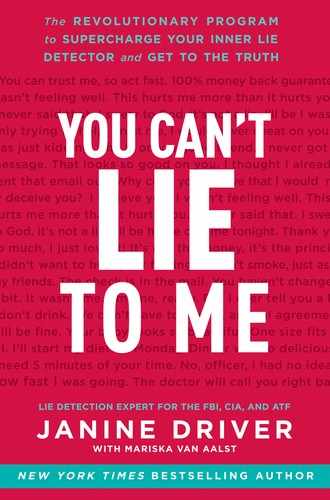10
THE SELF-EXAM
And the day came when the risk to remain tight in a bud was more painful than the risk it took to blossom.
—ANAÏS NIN
COMEDIAN AND ACTOR DANE COOK may be one of the funniest guys around—but getting ripped off by a family member is no laughing matter. My childhood neighbor and family friend Cathy Cook’s adorable little brother was robbed blind to the tune of $11 million by his own big brother, Darryl McCauley. After a decade of being Dane’s business manager, Darryl, his forty-five-year-old half brother, began embezzling millions of dollars from his baby brother’s bank accounts. Once, Dane’s big bro even wrote out a $3 million check to himself from Dane’s account. When police searched Darryl’s house in Maine, there was $800,000 in cash in the safe! Darryl was sentenced to five to six years in a Massachusetts state prison, ten years on probation once he is released, and he has been ordered to make restitution to Cook in the amount of $11 million.
Let’s all take a wake-up call from Dane! It’s time for all of us to conduct a little bit of internal affairs, wouldn’t you agree? Have you been turning a blind eye to a trusted loved one and giving them too much power over you in one area of your life or another? Or do you find that you frequently encounter deception by almost everyone in your life? Whether there is one liar or many in your life right now, it might be time to take a peek in the mirror. What mistakes are you making in your life that are stopping you from spotting that friendly phony? Or the complete opposite: Why are you attracting these losers, year after year? Why are cheating partners, lying bosses, and “frenemies” even in your world? Why are you choosing to let this poison leak into your life?
Scariest of all: If people are drawn to those most like themselves, what does their venomous behavior say about you?
Ouch. Even I don’t like to think about that last sentence. Recently I was betrayed by a trusted close friend, a betrayal that could have been avoided had I been paying closer attention at the time. Thank God that when I get knocked down, He helps me get back up again!
WHY IS SHE A FRENEMY?
We all have one—at least one. A person who “should” be your friend, but whom you just can’t bring yourself to trust. Maybe she’s burned you a few times; maybe she just makes you feel uncomfortable. You might have thought women had gotten beyond that catty competition—so what’s up?
That “catty competition” is not your imagination. One quantitative review of more than 272 studies, involving nearly 32,000 people from eighteen countries, found that, in general, women cooperate with men more than they do with other women.1 Despite the stereotype of men being cutthroat competitors, when it comes to the common good, they cooperate with other men more than women cooperate with each other. Why?
Evolutionary psychologists believe that men’s alliances tended to build resources for larger groups—together they could hunt more successfully and cover more territory. But women who might be thrown together could be co-wives, and therefore be in constant competition for sexual attention.
Well, okay—we may have an evolutionary explanation for mean girls and frenemies. But I think we can all agree that we are much better off working with each other than against one another! Take a good look at your immediate circle of friends, and make a list of the women you’re not sure you trust, the ones with whom you feel uncomfortable, regardless of whether you think you “should” like them or not. (“We have so much in common!” is not a reason to trust someone.) Don’t judge your feelings—just go with your gut. Then, make a list of those women who make you feel loved and whom you could call for help when you really need them. When it comes time to make social plans, focus your precious time and energy on this group of golden girls—they’re your real friends.
Let’s turn the BS Barometer around and take a good long look at your degree of honesty with yourself. Do you always give people second and third chances and expect a different result—and then blame them when they betray you again? Have you been turning a blind eye to suspicious behavior of your longtime trusted advisor and friend—and are you anxiously waiting for disaster to strike? Or are you so busy lately that you have given someone in your life too much power over the most important areas of your life—and you just assume that they have your back?
WHAT IS YOUR INTENT?
One of the most heartbreaking things that I see over and over in my seminars is smart people (usually women) who second-guess themselves and their decisions. The average woman simply doesn’t trust her gut. She might have suspicions about people or situations, but she doesn’t value her own instincts. So she puts herself into bad spots—whether bad jobs, dysfunctional love relationships, or toxic friendships—over and over again, thinking, “It must be me, I must be the problem.” She wants to find people who admire and trust her, people she knows have her back—but she doesn’t even have her own back.
I know that feeling all to well—because I’ve definitely been that person.
When I first moved to Virginia, I moved in with a friend, Jasmine, whom I had met when I worked at the FBI. Her husband had left her and her three kids on a family-centered holiday. My heart went out to her. So when I discovered that both of us were going to be working in Washington, D.C., I offered to take my per diem moving money and finish the basement of her new townhouse, so I could live there.
After I moved in, I became like a surrogate husband to Jaz and a surrogate father to her three wonderful kids. I painted her living room, I cleaned the house, I even picked up groceries from BJs. I’d make breakfast and lunch on weekends. I’d drop her youngest son off at day care and help her oldest son with homework after school.
After I had lived with Jaz and her kids for nine months, I met the man who would become my husband. Leif lived on Capitol Hill in Washington, D.C., which was an hour and a half away from Jaz’s house in northern Virginia. We started dating in October, and by late November I would stay over at his place and not come home until the next day. By May, Leif and I had bought a house together in Alexandria, Virginia.
You might already know what’s coming next.
At first, Jaz was supportive—even happy for me that I’d met someone. But as things started to get more serious, Jaz became really nasty to me. She started dropping these guilt trips, trying to make me feel bad for spending time “away.” “Must be nice,” she’d mumble at me when I came home the next day. “Hope you had a great time.”
At first, I felt bad. She needs my help, and I’m not there for her. Then, I started to think, This is crazy. “I’m not your husband, Jaz,” I’d say. “If you need help, you need to reach out to your ex.” I had a life, after all! I was a young woman in love. I wanted her to be happy for me. But more than that, I just wanted her to let me go.
Eventually, I moved in with Leif and moved my belongings out of Jaz’s townhouse. Slowly, we lost touch. Then, two weeks before my wedding to Leif, Jaz called and said, “I know you’re getting married soon, and I’m definitely going to be there. But I have a present for you that you have to get right now. Could you stop by the FBI building? I’ll meet you outside on the curb on your way to ATF.”
I was touched. I felt like, Wow, I must’ve been wrong about her. She really is happy for me. I was so relieved as I pulled up alongside her. I popped out of the car and came around and gave Jaz a big hug. I was so emotional with the wedding coming up—and so glad to share this moment of joy with all the people who cared about me.
I thanked her for the present, gave her a quick kiss on the cheek, and headed off to work. When I got to the parking lot, I ripped open the present. I sat there, stunned. In my hands, I held the book He’s Just Not That Into You. The title page was inscribed with the words, “He does not bring out the best in you, Janine. You should reconsider—because he’s just not that into you.” Ouch.
Now, it’s pretty clear that her intent was not, as she claimed, to help me. What was her hidden intent—to hurt me? To get me to doubt myself and my soon-to-be spouse?
And what was mine, as I eagerly rushed to her when she called me after months of silence? Was I honoring my instincts about her? Did I have my own back?
Your true intentions can spill over into all aspects of your life—and the lives of the people who cross your path. Many people who are looking to tune up their ability to detect deception and improve their communication skills skip the most important step: setting a positive and authentic intent—such as success, love, or truth. Instead, they often set a negative one, such as “The next guy better not be a cheater!”
THE BS BAROMETER READING
WITH THE LAWYER
Once a sweet, odd, and shy high school boy who disappeared in the back of the class, Adam Wheeler later conned his way into Harvard with claims of a perfect 4.0 from MIT and 1600 on his SATs. Wheeler became a muscle-head, a scholarship-winning, plagiarizing poet, and a young con man. Busted when he applied for a Rhodes scholarship, Wheeler was eventually indicted on twenty counts, including larceny and identity fraud. Wheeler had already made off with nearly $45,000 in grant and prize money, all won from plagiarized work.
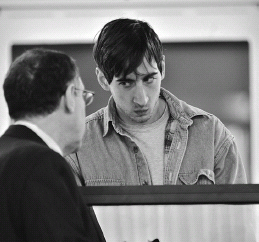
Convicted thief and plagiarist Adam Wheeler talking to his lawyer during his arraignment in May 2010. (Associated Press)
BS Barometer Reading: Full of It

However overly confident he once was—straight, strong posture, chin up and shoulders pulled back—that powerful body stature disappears quickly in court. Notice how Adam’s shoulders are slumped forward, making him a smaller target; his head is tilted to his right, and instead of looking his lawyer “straight in the eyes,” he peers out the sides of his eyes. This sideways glance could mean that Adam processes his world through primarily an auditory process (he is a poet, after all), “lending his lawyer an ear,” or it could indicate that he feels threatened or skeptical. As for Adam’s puckered lips, they send a signal of uncertainty.
Or “I hope I don’t appear nervous.”
Or “I hope people don’t think I’m a liar!”
When people focus on what they don’t want to happen, it’s as if their ability to honestly communicate and genuinely connect with other people just deflates. We’ve seen it happen: it’s clearly possible to have a super-polished speech (hello, Tiger Woods), armed with some pretty confident gestures, and people still won’t buy it. That’s because the “intent” is to fool others into believing one thing (that you are worthy of authentic, real, honest relationships, for example), when you yourself don’t even believe it’s true.
SHOWING UP—OR SHUTTING DOWN?
I’ll never forget the chilly winter night when my out-of-the-ordinary instructor grabbed a chair and started walking around the room dragging it behind him. “Hi, so nice to meet you,” he cheerfully said to a woman in the audience. “I’m sooooo excited to be on this super awesome date with you! You are sooooo pretty!” He whispered that he’d like to give her a kiss goodnight—and suddenly the chair floated off the ground and moved between both of their faces. As you might imagine, the student immediately “broke up” with her imaginary perfect blind date.
Next, the instructor began rambling around the room dragging two chairs. “Hi, so nice to meet you. I’m sooooo excited to be on this date.” There were at least four chairs that caused four breakups that night. The class: the Landmark Forum (www.landmarkeducation.com); the discussion: how we recycle our formerly damaged relationships.
The Landmark Forum leader explained that the chair-dragging is a perfect metaphor for our emotional baggage, the stuff we lug around from one relationship to the next. Once we’ve lived through a painful experience, we now look at life through a different lens. Maybe your lens says, “I was left at the altar.” Or maybe it says, “I’ve had two guys cheat on me.” Who knows—maybe your lens even says, “I cheated.” You now look at every relationship through that lens—especially when you look in the mirror.
Those lenses not only color every interaction—they sometimes blind us entirely. As we do the self-exam, we need to take a good hard look at all the deceptive lenses we use to view the world and how they can block us from creating genuine, authentic relationships with ourselves and others.
Denial
As we talked about at the beginning of the book, one of the three main reasons that people don’t detect lies is very simple: because they don’t want to. We all have certain realities that we don’t want to face. Maybe you suspect your boyfriend of cheating—but you’re thirty-five and want to have a baby soon. Maybe you think your employee is skimming off the top—but she’s great with the customers and the losses aren’t that much. Maybe you think your husband is gay—but you can’t bear to think what it would do to the kids if you were to confront him.
In some industries, reality is kept from the CEOs in order to give them “plausible deniability”—they don’t want to know what they don’t want to know. But for common folk, run-of-the-mill denial is usually the cause. Denial can prevent us from seeing the truth that’s right in front of our eyes. Paul Ekman even has a name for this: the Ostrich Effect.2 We bury our heads in the sand rather than confront uncomfortable truths. Denial is the mac-daddy of all lenses that prevents us from having a genuine, honest life.
Prejudices
None of us likes to think of ourselves as a racist. Or a sexist. Or an anything–ist, for that matter. But even the most forward-thinking person can be swayed by difference. Several studies have found that we read people who share our same race more accurately than we do those of other races. We tend to attribute more complex mental states to them, we look at them holistically, we pick up more subtleties, and we remember their expressions longer. Brain scans have shown that our reptilian brain—the amygdala, the seat of our most basic emotions—responds more intensely to expressions of fear of people who share our race.
One study found that both Japanese and white Americans experienced the same phenomenon—more brain activation in response to emotions from people of their own race versus those of the other race. When asked to verbally identify emotions, both groups were 10 percent better at identifying the emotions of those who shared their race.3 We might say we “don’t see color”—but saying that is just another very socially acceptable form of denial.
Now, this heightened sensitivity to the feelings of our own race is not necessarily caused by closed-mindedness. Scientists believe we evolved that way because we likely had strategic alliances with other people within our “group,” so that any lies or betrayal from within that group would be more serious and threatening to our survival. In other words, we might have these biases precisely because we realize how much we need other people and how much they need us. That doesn’t excuse us from questioning these biases—let alone making decisions about people’s trustworthiness or honesty—based on race.
Stereotypes
As a plus-size woman, I have dealt with my share of stereotypes—but I’ve perpetuated them, too. For example, when I’m out in public, I’m always subconsciously looking for someone heavier than me. Then I can think, At least I’m not that heavy. I do understand that our brains are evolutionarily programmed to prefer beauty, and to a certain degree, that knee-jerk anti-fat bias is not our fault. But we do need to remain aware of this powerful “beauty bias”—and never was that more apparent to me than with Casey Anthony. I firmly believe that had she not been a beautiful, fit young woman, there would have been a different verdict.
This bias for beautiful faces has been documented by science. People believe they can judge the “trustworthiness” of a person almost instantly—within the first 100 milliseconds of seeing the face for the first time. But one study showed this bias to be as wrong as they come. A group of study subjects believed their ability to judge a person’s trustworthiness was unshakable, yet they were completely unable to tell the difference between generous philanthropists and dangerous criminals from America’s Most Wanted. This “facial appearance heuristic” is a clearly documented bias that people believe men and women with attractive, symmetrical faces are the most honest.4
I followed the Casey Anthony trial every day of testimony. As a mother of a child who is about the same age as Caylee, and as a former federal law enforcement official, the case hit me on all levels. Casey Anthony, the smoking-hot girl, was found not guilty—but imagine how different the trial would’ve gone if she’d been 300 pounds and had a few teeth missing. If you ask me, had that been the case, she would not be free today.
Power Lust
We’ve talked about the fact that power corrupts, and corruption brings more power—which can be an intoxicating cycle that can get people caught up, almost like an addiction. We would hope that when someone lies or cheats it would decrease that person’s power, but it actually enhances it in the eyes of those who are watching. One study of 169 people found that, when told a story about a bookkeeper who bent the rules versus one who followed them, the rule bender was more often seen as someone who could influence other people’s pay level and promotions, “make life difficult,” or “make things unpleasant at work.” The rule bender was seen as a person more in command of his own actions and the situation. This result has been duplicated in dozens of studies: people who lie, cheat, steal, and break the rules are seen as having more power, and may influence us, even if we consciously disapprove of their behavior.
THE BS BAROMETER READING
ON THE STAND
Na-na-na-na-na, you can’t catch me!
For this BS Barometer challenge, you’ll take Casey Anthony’s emotional pulse through analyzing three of her many childlike gestures. Casey’s legendary moody disposition allowed her to vacillate between being enraged and petulant (yelling in her jailhouse call, “They just want Caylee back. That’s all they’re worried about right now, is getting Caylee back,”) to being happy (to see the brother who supposedly molested her) to seething with contempt, anger, and teeth-flashing rage (in court, no less). Is that behavior suspicious? Let’s see.

Get over here or I’m going to tickle you! (Getty Images)
Here you’ll notice Casey, during a recess in her murder trial on June 30, 2011, tilting her head, squinting her eyes, playfully gesturing to someone in the courtroom, as if she is motioning for a toddler to get over here before the scary tickle monster gets you. Casey had many “imaginary friends”—such as “Zenaida,” the nanny who supposedly kidnapped Caylee; “Jeffrey,” the friend who referred the nanny; and “Juliette Lewis,” her coworker at the job she told her parents she still held at Universal Studios, despite having not worked there since Caylee’s birth.

Nobody wants to play with me anymore. (Getty Images)
On June 8, 2011, Casey is spotted leaning back in her chair sulking, with a tense jaw, her chin pulled in, and a pout on her face, next to her attorney Dorothy Clay Sims. When people stare straight ahead daydreaming, they are often having internal dialogue, a.k.a. self-talk. If only we could be a fly inside what many psychologists have called her “sociopathic brain.” When her brother first asked why she wasn’t bringing Caylee home after thirty-one days, she said, “Because maybe I’m a spiteful bitch!” before spinning the tale of the kidnapping nanny.

Did I just get away with murder, or what? (Getty Images)
On July 7, 2011, during Casey’s sentencing on charges of lying to law enforcement, she is seen with a smile of “Duper’s Delight,” giving herself a massage by stretching her fingers and bending them backward. This self-touch gesture relieves stress and increases pleasure by decreasing the pressure in the capsule inside the joint. A week later, George Anthony, Casey’s own father, said on Dr. Phil that he believes Casey should be held responsible for Caylee’s death.
BS Barometer Reading: Full of It
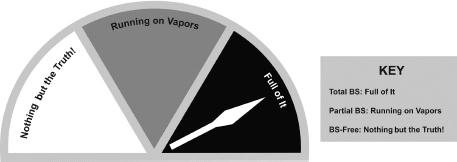
Casey is the prima donna of master manipulators. She can lie quickly and with ease! She lied about a nonexistent nanny, the nanny’s address, her job, her friends, her boyfriends, her whereabouts, her child’s father—she even stole a checkbook from her best friend. She may have been acquitted for the murder, but we can safely call her a liar—as deception was the only charge that actually stuck in this sad case.
You also might think that “rude” people would be seen as lower class, but rude signals also indicate that those people have power. When we consciously know that, of course, we can try to remain vigilant for those signs and signals and watch our own reaction to them. Do you overtly disapprove of the loudmouth at the bar but secretly admire his or her confidence?
Could it be that you keep falling for the same kind of lying jerk because he gives off the bad-boy/I’m-in-charge kind of vibe? What may be understandable from an evolutionary point of view—our genes want a Cro-Magnon man who can defend us and bring home the bacon!—can be totally destructive in this day and age.
Make sure you are clear about your relationship to power. Know the nonverbal and status-enhancing signals that may be influencing you outside the realm of your awareness. Always ask yourself, “What does this person want? What do they gain—and what do I give up—if I give it to them?”
WHAT’S YOUR PAYOFF?
In the movie Up in the Air, George Clooney plays a professional hatchet man, a guy whose job is laying people off. What makes him so good? He’s a master at “reframing” the horrible situation. George’s character would ooze empathy and say, “Don’t think of this as a layoff—think of this as an opportunity to follow your life dream.”
Now, we all know this is BS—but this is the good kind of BS. The essence of what George is saying is true: we can decide how we deal with the outcome of any situation. We can decide what our payoff will be.
Will you be a victim of a bully boss? Or will you use that situation to work up the nerve to quit and start your own company?
Will you wallow in self-pity for a relationship that didn’t work out? Or will you be grateful that you saw the warning signs and were “relieved” of that connection before you had invested more time?
Will you take this last deception as yet more evidence that you can only get hurt? Or will you use it to create stronger boundaries, to recognize the warning signs, and to focus on the qualities you do want in your relationships? Honesty. Strength. Integrity. Compassion.
7-SECOND FIX
THE NEIGHBORHOOD DOORMAT

(Baron Thrower II)
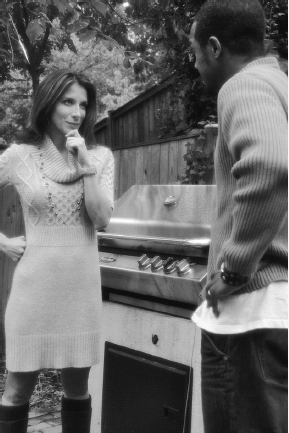
(Baron Thrower II)
The Problem: You’re sick of being the neighborhood doormat for dog watching, yard watering, and babysitting, and you’re ready to create action.
The Fix: Become a “short fat candle” (your feet are between one and two feet apart) and hold your chin. This move arouses in others the belief that you have power and confidence. “Believe me, [pause] my schedule is so packed right now, I can barely walk my own dog. I think [pause] you’ll agree with me [pause and soften voice] that there are other people in the neighborhood with more time on their hands who will be able to help you.”
The Result: Your neighbors will be more respectful of your time and start asking someone else to do their chores.
It’s up to you to decide. What’s your payoff? Is there a bigger payoff in confronting the liars in your life? Or is the bigger payoff to remain a victim? Make no mistake—you’re getting something out of both choices.
Everything we do in our lives has a payoff. Take a look at this chart to consider some examples of perceived versus hidden payoffs. As you read, consider what your hidden payoffs might be.
Example
Your mom put her foot down, and she won’t let you borrow $500 (again) to pay your overdue cell phone bill.
Action: You throw a “Poor Me” pity party (that is, you have an adult tantrum).
Perceived Payoff: You show your mom how selfish she’s being and prove that people aren’t helping you.
Hidden Payoff: You get to feel like a victim, which helps you rationalize why you can’t land a job.
Example
You discover that your boss has cooked the books, and you confront him.
Action: He offers you a promotion in return for your silence. You decide to turn him in.
Perceived Payoff: You get to look like a hero.
Hidden Payoff: You feel proud that you’ve done the right thing and acted ethically. You can sleep at night!
Example
Your seven-year-old son begs you to forgive him after he calls you a bad name, so he can play another round of his favorite Wii game.
Action: You give in.
Perceived Payoff: Your son gives you a big kiss and a huge hug, and you feel appreciated and connected to him. You get to feel in control, and you feel loved.
Hidden Payoff: You don’t have to think about why he called you that bad name or what kind of precedent you’re setting with his behavior.
Example
You discover a mistake on your tax form—that nets you an extra thousand bucks.
Action: You call your accountant and point it out.
Perceived Payoff: A negative payoff—you’re out $1,000!
Hidden Payoff: You won’t get charged with tax evasion. You can breathe easy with a clean conscience.
Example
Your wife wants to have sex tonight—but last night you wanted to have sex, and she was too tired.
Action: You refuse to give in and deny her advances.
Perceived Payoff: You get to get her back—now instead of feeling powerless, like you did last night, you feel powerful.
Hidden Payoff: You maintain the distance in your relationship, so you don’t have to feel vulnerable or think about why you’re not “in sync.”
Example
Without asking you, your significant other promises her family that you’ll both be spending Christmas with them in Connecticut.
Action: Your partner tries to persuade you with compliments and small gifts. After careful consideration, you decide to agree.
Perceived Payoff: Compliments and small gifts! And you feel like “the good guy.”
Hidden Payoff: Ultimately, you both feel respected—and your initial resistance ends up bringing the two of you closer.
Example
You are overweight and you know it, and now your health is really being affected.
Action: You continue to do nothing to get healthier.
Perceived Payoff: Being heavy gives you a way to judge people: if they still like you, they’re true friends. If they don’t, they’re just “superficial.”
Hidden Payoff: Maybe deep down, you use your weight as a way to keep people at a distance, so they never know the “real” you and they can’t hurt you.
Example
You see your friend’s boyfriend out with his ex for lunch.
Action: You snap a photo with your phone, and break the news to your crushed BFF.
Perceived Payoff: You protect your friend from this horrible man.
Hidden Payoff: You feel like a good friend. And you get your Friday night happy hour pal back!
CHALLENGE YOUR INNER LIAR
We are extremely connected to other people in ways we are only just beginning to grasp. We feel our connection to other people very acutely—when we are rejected socially, it activates the same neural pathways as when we experience physical pain. Even when we feel embarrassment for someone else, our brains experience this physical pain. When it comes to our relationships, whether with other people or with ourselves, there is no mind-body “connection”—it is, quite literally, all the same thing.5
When we continue to lie to ourselves, we are fooling no one, and that denial is taking a physical toll on our bodies. We have to look at it like a metaphorical Band-Aid—and rip off that denial. The harsh pain we experience in the short term, when we face up to the deception we’ve “known” but ignored for weeks, months, or even years, is much better than the buried pain that festers and eats away at us from the inside.
When you rip off that bandage, and admit the deceit—he is cheating, she is trying to get your job, you don’t love her—the skin underneath might, indeed, be raw and exposed. But you’ve just opened yourself up to more—more honesty, more connection, more authenticity. By being willing to face the pain now, you’re saying “Yes” to the beautiful thing to come. You now know how to recognize truth and even more important, you know how truth feels: Lighter. Easier. More free.
NEED TO GET IT OFF YOUR CHEST?
When it comes to lies and deceit, some would say that Catholics have it made—the confessional is the ultimate lie cleanser. There are other places where you can anonymously release the lie and feel unburdened.
Postsecret.com. People send in postcards with their most closely held secrets. See many confessions of infidelity, theft, and other lies.
Dishonestylab.com. People email/tweet their biggest lies, from toddler shoplifting incidents to tearing up a parent’s will in order to get a bigger slice of the inheritance pie.
Grouphug.us. A simple site that allows you to just log in and confess—and then forget it. Each poster is tagged with a number—no other identifying details. Freedom is just a click away!
TURN THE BS BAROMETER ON YOURSELF
You’ve learned a great deal about lying in this book—how it shows up, what it looks like, even why people do it. Now it’s time for you to turn the BS Barometer back on yourself, and dig deep: Where are you in all of this? Here are some hard questions I’d like you to consider. Consider this your own personal interrogation:
What’s at stake for you? What issues brought you to this book? Were you interested in getting a leg up on dishonest salespeople? Sneaky teens? Suspicious caregivers? Or have you had a series of dishonest friends and lovers? Or, is it possible that you suspect others without cause—because the dishonest person is you?
What is the intel someone could gather on you? How have you been interacting with people around truth and honesty? Do you lie to your mother? Your kids? Are you honest in your business dealings? Do you return extra change?
What would a wiretap show about you? Is your résumé 100 percent legit? Do you gossip about friends or casually lie to get out of social engagements?
What would the stakeout and full body surveillance show about the “real” you? If someone used the stakeout and full body surveillance on you, what would they see? Would they see someone who takes pride in his or her appearance? Someone who stands strong in his or her own power?
And, finally,
What would a true interrogation reveal about you? Are you someone who would rather hide her true self than feel vulnerable and exposed? Are you ready to stop hiding and to start living your life out loud?
To create a life you love, you must first imagine how you want your life to be and the steps you need to make any necessary changes. Start by simply visualizing your goals and committing to writing them down. The self-exam exercises will help you on your way.
As you look to your future, take a few minutes to reflect on how far you’ve come and where you want to go next. You will be far more likely to succeed this year and in the years to come! And wherever your path will take you, know that your BS Barometer will help you build the caring, honest, authentic connections that make life worth living.
POWER TEAM TURNAROUND

(Baron Thrower II)
Name: Erin Gelzer
Age: 34
Occupation: Real estate developer
What was stopping you from spotting master manipulators and liars?
I can be guilty of deception in relationships. I try to be very honest, but I frequently lie by omission. I don’t tell people what my real motivations are, or I don’t tell people what I am really thinking. I also think it works the same way in reverse. I don’t feel that people typically lie to me—more that they skirt the truth, or gloss over what they are really thinking, or tell me what I want to hear.
How have you changed?
I think strengthening my BS Barometer will make me feel stronger and less afraid in relationships. Sometimes the unwinding of a relationship has just been due to freaking out about what I don’t know. Having more confidence in my ability to detect when I am being duped will probably help me have more stable, carefree relationships.
I used to be so focused on myself in a conversation—what I thought, what my reaction was to what someone was saying, how I was coming across. I now realize I was missing a lot of cues from those around me. I was focusing on their words and was blind to the other nonverbal signals people were giving off. The BS Barometer training helped me to become more present, which helps not only in detecting lies but also in being a better friend, daughter, employee, and so on. I learned to not hold back or play it safe, to say what I think in my gut regardless of opposition.
I think this program will make me much more powerful and confident in both my relationships and my career. It has already given me more confidence that I can trust my instincts in a situation, protect and stand up for myself, and have the insight to know whom to trust. Beyond just detecting deception, the program has also taught me to be others-focused, to play life full out and be fully engaged, and to express gratitude.
EXERCISING YOUR BS BAROMETER: THE SELF-EXAM
Set Your Best Intentions
To help you get started, here is a short list of some positive intentions you can choose. I love to choose two or three at a time. Some of my favorite combos include “success, opportunity, and abundance”; “joy and serenity—no matter what”; and “love, forgiveness, and trust”:
Abundance |
Generosity |
Patience |
Acceptance |
Gentleness |
Peace |
Beauty |
Honesty |
Reliability |
Caring |
Honor |
Respect |
Commitment |
Humility |
Serenity |
Compassion |
Integrity |
Service |
Confidence |
Joy |
Strength |
Courage |
Justice |
Success |
Creativity |
Kindness |
Tact |
Enthusiasm |
Love |
Thankfulness |
Excellence |
Loyalty |
Tolerance |
Flexibility |
Magic |
Trust |
Friendliness |
Moderation |
Truthfulness |
Forgiveness |
Modesty |
Understanding |
Circle one to three of the intentions listed, or create your own, and then kick it up a notch by adding the word ridiculous in front of it! For example, “My intent is for ridiculous amounts of love, forgiveness, and trust.”
Strike a Power Pose
A recent study suggests that standing in a powerful pose for as little as one minute can help you perceive yourself as more powerful, decrease the level of stress hormones in your body, and even increase your tolerance for risk.6 Use a few of these basic power moves the next time you’re feeling unsteady or insecure. Stand and sit in confident poses at the office to show that you mean business—you’re not a pushover and you take your work seriously. If you’ve been burned in the past, these moves can be especially helpful to rebuild your confidence before you take the leap and trust again. (For more Power Poses, check out “Tune Up Your Power Gestures” in my first book, You Say More Than You Think.)
The Steve Jobs Hand-on-Chin Power Pose

On May 2, 1985, at the Tavern on the Green in New York, co-founder of Apple Inc. and inventing superstar Steve Jobs displays the Steve Jobs Hand-on-Chin Power Pose while sharing the spotlight with another computer genius, co-founder of Microsoft, Bill Gates. (Getty Images)
When speaking with someone in person and they ask you a question or for a favor and you have a burst of uncertainty or an increase in stress, avoid rubbing your temple or neck or playing with your cuticles! Instead, simply grab your chin. Then say something like: “Let me think about it and I’ll get back to you tomorrow with more information.” In less than three seconds, you can look so much more intelligent!
The Elbow Power Pop Position
When seated, relax, take up space, and pop your elbow over the back of the chair. Immediately you’ll look and feel confident, yet likable. This is a great power move to initiate during your next office meeting, while waiting for your blind date to arrive, or when your kids come home after they have snuck out of the house! This little baby is one of my faves—it packs a punch of power, while at the same time leaves you looking cool, calm, and confident!
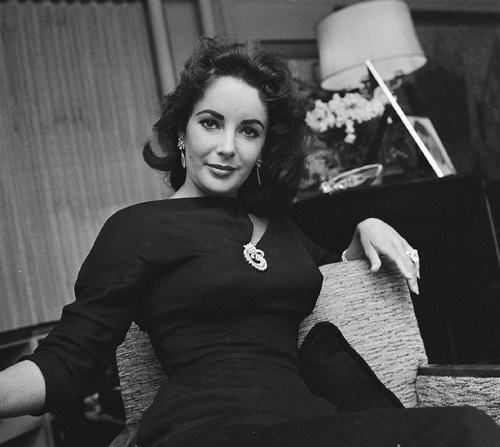
On February 20, 1957, with her arm over the back of her chair, Hollywood’s Golden Age actress Elizabeth Taylor glamorously demonstrates “The Elbow Power Pop” position. (Getty Images)
Face Yourself
Take out a piece of paper, and at the top, write the one issue in your life that you would love to change. Shine a light on this difficult part of your life and ask yourself, “Where is my denial undermining my success in resolving this situation or circumstance?” Write down some possible solutions that would work if you had unlimited time, resources, and will. Look in the mirror each morning and ask yourself, “When I think about this issue, am I being honest with myself and others?”
What Will Be Your Legacy?
This visualization exercise helps you quickly zero in on the three biggest changes you need to make in order to achieve your goals and bring more honest, open, and genuine relationships into your life. Ask yourself probing questions.
- How is your current lifestyle helping to create your destiny?
- How will you be remembered after you are gone?
What are you actively working toward achieving or becoming? What kind of life do you really want? What are your top personal and professional goals?
Take a few moments to gather these thoughts together. Now, imagine you have achieved them all. From your point of view, how would you commemorate your life on your tombstone?
Now write down how you would like other people to remember you.
- What changes will you really make to create the legacy you desire?
- When do you plan to make these changes? Be specific: commit to the year, month, day, and time of the day to increase the likelihood you will stick to the goal.
- How do you intend to hold yourself accountable to these plans?
- What roadblocks do you see that may prevent you from following through on this commitment to yourself?
- What proactive steps can you take now to ensure these potential difficulties will not negatively affect your success?
- How did these exercises (and this book) make you feel?
Can You Judge a Book by Its Cover: Serial Killer or Corporate Queen?
Based on their faces, their clothing, and their expressions, can you identify how many serial killers or corporate queens are pictured below?
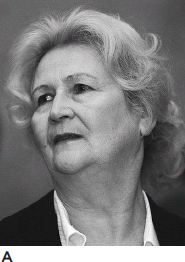
(Getty Images)

(Pekka Sakki/AFP)

(Getty Images)
Answers
A: Serial Killer. On November 18, 2003, seventy-two-year-old Elfriede Blauensteiner, who always dressed in black, and was dubbed “Black Widow,” died in jail, while serving a life sentence for murder. She confessed to killing five fellow elderly people she took care of, for their assets.
B: Serial Killer. On December 22, 2010, Finnish nurse Aino Nykopp-Koski was sentenced to life in prison for murdering five patients between the ages of seventy and ninety-one and attempting to murder five more elderly. Her apparently motiveless killing spree was done by giving her patients drugs they had not been prescribed, including sedatives and opiates.
C: Corporate Queen. On November 2010, Carol Bartz, former CEO of Yahoo!, Inc., speaks at the Web 2.0 Summit in San Francisco.
Did you guess correctly? This exercise demonstrates why you can’t judge a book by its cover. Sometimes during my ninety-minute corporate keynote presentations, I’ll have the audience participate in a playful interactive first impression exercise. They each tape a piece of paper on their backs and walk around introducing themselves to five strangers. After a quick hello, they write on each other’s backs their initial thoughts about one another. Surprisingly, some people will write on these complete strangers’ backs such powerful words as “trustworthy,” “kind,” “honest,” and “truthful.”
Really?
Can you really trust someone within minutes? How about in hours? Years? A decade? Unfortunately, no—at least, not 100 percent!
Just ask Dane Cook! And Dane’s not alone. One year while I was being a mom, going through an intense medical treatment, training a new employee as the director of education at the Body Language Institute (BLI), and flying from one end of the country to the other for speaking engagements, my stress level was ridiculously high! I was distracted and desperate for serenity and certainty, and I couldn’t add any more responsibility to my plate. I was so overwhelmed that without me consciously knowing it, my BS Barometer was occasionally on the fritz.
That year, on Christmas Eve day, within a four-hour span of time, everything came crashing down on me: I discovered I’d lost a fledgling pregnancy. I had a major project land in my lap right before a planned vacation with my family. And I discovered that my good friend, whom I had trusted with my most intimate secrets, ideas, and dreams, had taken advantage of me during my most difficult days. This woman had been a trusted friend for years. I admired her. I looked up to her. I sang her praises to my family, my friends, and even my clients. However, when I was emotionally overloaded, she took advantage of me, and I was devastated.
After I finished crying and kicking myself that someone in my inner circle would betray me, I dusted off my smile. I reset my intention to “Love, Success, and Serenity—no matter what!” Wouldn’t you know it—within the next five days, the phone never stopped ringing with new business. I reconnected with an old friend. And my son got his dream present from Santa: the Star Wars LEGO Death Star!
Life is good.
Why am I telling you about my personal deceptive sucker-punch to the gut? Because maybe by sharing my story, you’ll take a look at the checking account your husband manages for the family, or you’ll move your investments into someone else’s hands, or you’ll find out that you really aren’t getting paid as much as the guy down the hall doing the same job you do, or you’ll simply make smarter decisions about who you have protecting your assets—and I don’t just mean your money.
While the nurse watching your grandfather might not be a serial killer, and your older brother might not be embezzling from you, and your good friend might not have betrayed you, it’s crucial that you be cautious about giving the people in your life too much power. Now, remember: I’m not telling you not to trust people. I’m just reminding you to ask questions, be nosy, make surprise visits, and conduct random audits of whoever is managing your money or the care of the people you love. If it can happen to Dane and it can happen to me, it can happen to you. Be smart. Trust your gut and, when you’re in a crisis, look around: Whose life could receive a high payoff as a result of you being buried deep in your crisis?
Now fetch your BS Barometer and investigate anyone who just came to mind. You know more than you think you know, so do something about it! You are so worth it! When you discover whatever it is you discover, breathe deeply, then set a powerful and positive intention and believe it with your heart and soul.
Finally, be grateful for something, anything—even if it’s that Santa brought your son his dream toy and he says to you what Angus said to me: “Mom, this is the best day of my life—ever!”
JUST REMEMBER …
- Every aspect of communication begins with intention. You can choose whether that intention is positive or negative. Negative intentions break down relationships, opportunities, and self-esteem. Positive intentions create possibilities, growth, confidence, and love.
- We all view the world through our own lenses. Taking time to examine your own prejudices will help open you up to alternatives you’ve not even considered.
- The biggest lens of all is our own denial. What are you hiding from? And how would your life improve if you faced your biggest fears head-on?
